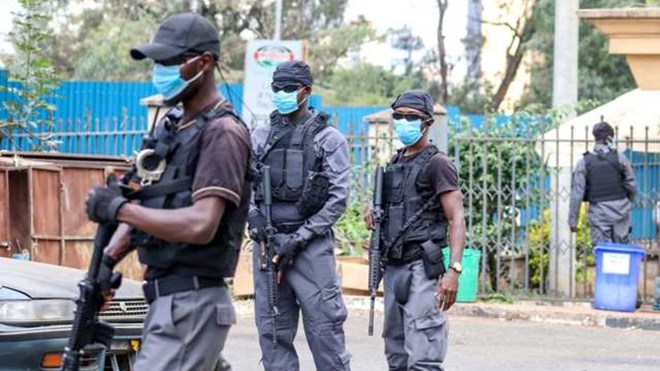
Sunday August 29, 2021
By LUKE ANAMI

Kenya’s Anti-terror Police Unit outside the Milimani Law Court Nairobi on Tuesday, October 6, 2020. PHOTO | FILE
The East African Community is working on Counter Terrorism Centre (EA CTC) that would co-ordinate the bloc’s response in case of an attack.
“Consensus was reached on the need to establish a brand new EA Counter Terrorism Centre separate from the Defence Counter Terrorism Centre as an institution of the Community,” said Peter Odoyo, Kenya’s Chief Administrative Secretary for National Security.
“Each of us has been dealing with immigration and counter terrorism on their own and now we have come together. The EA Counter Terrorism Centre is under discussion. It is still under infancy stages.”
The Sectoral Council on Cooperation in Defence Affairs at its 31st Meeting directed the Secretariat to develop a roadmap towards establishment of EA CTC and report to its 32nd Meeting.
According to the treaty for the establishment of the EAC, tor the Secretariat to activate procedures for establishment of EAC organs and institutions, the the Council needs to recommend to the Summit establishment of the centre.
Mr Odoyo, who chaired the 10th EAC Joint Meeting of the Sectoral Council on Cooperation in Defence Affairs, Interstate Security and Foreign Policy Coordination in Arusha on August 20, said the process will also entail identifying funding.
“We also have to do further consultations within the various bodies,” he said.
EA Counter Terrorism Centre is different from the Defence Counter Terrorism Centre (CTC), which as an institution of the EAC.
The centre’s role includes training, gathering and sharing of intelligence information, and sharing of ideas.
“Terrorism is a reality now. It is also evolving and becoming more sophisticated. It means that law enforcement body must also have a centre point at where they can be trained and informed and can share ideas, and intelligence information,” said Mr Odoyo who chaired the meeting on behalf of Kenya’s Cabinet Secretary in charge of Interior and Security Dr red Matiangi.
“Our region is prone to terrorism. As a community, it is important that we have an institution that is specifically designated to handle the issues of threats of any nature. This is to ensure that we keep our region safe,” said Dr Peter Mathuki, EAC Secretary General.
“For us to handle peace and security effectively, we need an institution that looks into these issues,” he said
The EAC has already set up the Eastern Africa Standby Force (EASF) to support peace in the region.
EASF is made up of troops from 10 states — Burundi, Comoros, Djibouti, Ethiopia, Kenya, Rwanda, Seychelles, Somalia, Sudan and Uganda, while Eritrea and South Sudan are yet to join.
The 5,800-strong force attained full operational capability in December 2014 but has remained in obscurity despite the many troubles spots in the region such as Somalia and South Sudan.
The EASF can deploy in 14 days. However three countries—Burundi, Comoros and Somalia—are yet to ratify the agreement that established the force.
“The EA CTC is different from the EASF in that the centre’s role will be more of detect and prevent,” explained Dr Mathuki.
Capacity
“It will be able to build capacity of the forces, liaise with institutions if any. We don’t have specialised institutions in the EAC to handle this. This is a recommendation which will be forwarded to the full council.”
The proposal to form the EA CTC comes at a time the East, Central and Southern Africa face multiple threats relating to violent extremism conducive to terrorism.
This month, Rwandan forces deployed to help Mozambique’s army battle militants last week recaptured control of the key northern port of Mocimboa da Praia from the extremist militants.
Although other groups also operate in the East African region, al Shabaab poses the most persistent threat to security despite strategic and operational setbacks in recent years.
Based in Somalia and with strong links to international terrorist organisations such as al Qaeda, al Shabaab carries out attacks against government forces and the African Union Mission to Somalia (Amisom). It has also carried out attacks in Kenya, Djibouti, Uganda, Tanzania and Ethiopia.